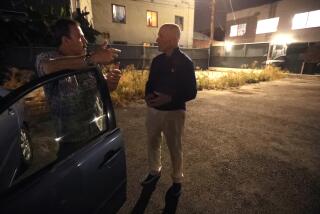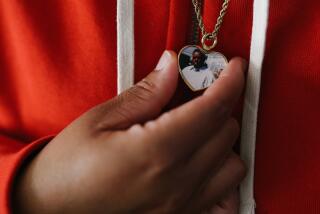Freed Filmmaker Seeks Release of Man in U.S. Prison in Iraq
A Los Angeles filmmaker who was imprisoned by the U.S. military for 55 days in Iraq before being cleared and released is now attempting to secure the freedom of an Iraqi man he met while in a prison on the outskirts of Baghdad.
Cyrus Kar, the filmmaker, said that Numan Adnan Al Kaby is a longtime lawful permanent resident of the United States who returned to Iraq after U.S. forces toppled Saddam Husseinâs regime. Al Kaby is still being held captive even though a U.S. military review board on July 4 cleared him of involvement in an attack on a U.S. base there.
Kar, who had gone to Iraq to make a documentary on Cyrus the Great, the ancient Persian ruler who wrote the worldâs first human rights charter, said that both he and Al Kaby received identical letters from the U.S. military. The letters declared each man an âinnocent civilian,â he said.
Karâs story, detailed in the Los Angeles Times in July and confirmed through numerous interviews, offered a rare glimpse into the experiences of captives held by the U.S. military in Iraq.
The Pentagon acknowledged that his imprisonment âwas difficult for Mr. Kar and his family,â but said it was essential to conducting a thorough investigation into possible terrorism.
Kar and Al Kabyâs cousin, Haider Al Saedy, who lives in Kalamazoo, Mich., said they plan to file a federal lawsuit in Washington, D.C., today seeking Al Kabyâs release.
A draft of the lawsuit, provided to The Times by the American Civil Liberties Union, states that Al Kaby, 38, is being held in violation of the U.S. Constitution, the Geneva Convention and customary international law.
âI understand our soldiers need to take all precautions in a war zone, but once a person is found innocent,â the U.S. government needs âto do what is right,â said Kar, who was held for several weeks after an FBI investigation cleared him of any involvement with terrorists.
âI donât know where my cousin is or why heâs being held,â said Al Saedy, with whom Al Kaby lived in Michigan for years before the U.S. invasion of Iraq in 2003. âHeâs innocent, but heâs still in jail and canât speak with our family.â
A Defense Department spokesman, speaking on condition of anonymity, acknowledged that U.S. forces took âa lawful permanent U.S. residentâ into custody in April âfor suspected insurgent or terrorist activities,â and that the individual remains in custody. But the spokesman would not identify that person.
Al Saedy said that both his family and Al Kabyâs family âwere always against the government of Saddam Hussein because it was cruel and tortured people.â Al Saedy said he left Iraq in 1991 after Husseinâs troops quelled a Shiite uprising after the Gulf War.
He said he turned himself over to U.S. soldiers near the Kuwait border and was taken to a refugee camp in Saudi Arabia, where he stayed for seven years.
In the huge camp of 30,000 Iraqi refugees, Al Saedy said he saw his cousin Al Kaby and soon the two were living in the same bunkhouse. âWe became very good friends,â he said.
Al Saedy said that Al Kaby got a refugee visa to the United States late in 1994 and subsequently gained political asylum. Al Kaby went first to Rockford, Ill., where he had a distant cousin and worked at a factory. Then, he moved to Salt Lake City and worked at an airport eatery that made cinnamon rolls. In 1997, Al Saedy got a refugee visa for the United States and joined his cousin in Salt Lake City.
After other moves, the two men landed in Kalamazoo and bought a small restaurant. âWe called it Ali Babbaâs, and served Middle Eastern food,â Al Saedy said. Then, they bought another small restaurant. In 2003, both men applied for U.S. citizenship.
The following year they sold the restaurants, and Al Kaby decided to return to his native land to see his parents, brothers and sisters. âHe thought since Saddam was gone, it would finally be safe for him to go,â Al Saedy said.
In a sworn declaration prepared for the lawsuit, Kar said he met Al Kaby at Camp Cropper, one of the three main U.S. prisons in Iraq, in early June.
Initially, Kar knew him as âPrisoner 170,â and Al Kaby occupied an adjoining 8-foot-by-8-foot cell.
At first, Kar said, he was suspicious. âI was scared that the government might have sent him to spy on me,â Kar said. âNo detainee in solitary confinement was allowed to talk to any other detainee, so it was unusual.... The MPs said that it was allowed only because we both were âcleared.â Eventually, I realized he was not a spy, and I warmed up to him.â
Al Kaby told him he had been working for an American company engaged in postwar reconstruction in Baghdad. One day in April, Al Kaby said he called in sick so he could take his brother to buy a car.
When he returned to work at a U.S. base two days later, Al Kaby said he was confronted by a handful of Marines who told him he was fired.
Then they arrested him, noting he had called in sick on a day when the base came under mortar attack.
Al Kaby told Kar he denied advance knowledge of the attack but was imprisoned.
âLike me, Numan had no access to a lawyer or to consular officials while in detention,â Kar said. âLike me, he was allowed very rare phone calls to his family, and no visitors of any kind.â
Kar had been taken into custody in mid-May after military authorities found timers that could be used in improvised explosive devices in the trunk of a taxi Kar and his cameramen were riding in. An FBI investigation cleared Kar by mid-June, but he was held for nearly another month.
On July 4, both Kar and Al Kaby had hearings before three military judges and a court reporter, Kar said in his declaration.
âThat night a guard told us that both of us had been found innocent,â Kar said. âSince we were innocent, the guards let us have sodas or Gatorade if we wanted and told us that we were just waiting to be released.â
Two days later, Kar said, Lt. Col. Carol V. Haas, the commandant of Camp Cropper, met with him and Al Kaby in Karâs cell.
âNuman didnât understand his letter, so he asked me to read it for him, and the colonel said that was fine,â Kar said in his declaration.
According to the lawsuit, the letter said the judges determined Al Kaby was an âinnocent civilian,â meaning someone âwho does not pose a threat to the security of coalition forces, or its mission, and should be immediately returned to his home or released.â
Four days later, on July 10, Kar was released and returned to the U.S. But Al Kaby was not.
âThe government is turning justice on its head by keeping an innocent man in jail,â said Mark D. Rosenbaum, the legal director of the ACLU of Southern California, who filed a lawsuit on Karâs behalf when he was imprisoned and plans to file the new suit today.
A draft of the lawsuit said Al Kabyâs imprisonment âeviscerates the bedrock assumptions of our constitutional democracy. Left uncorrected, this system becomes one wherein an individual is not just guilty until proven innocent; he is guilty even after proven innocent.â
A spokesman for the U.S. military in Iraq said he could provide no information on Al Kaby.
The Pentagon spokesman who acknowledged that âcoalition forcesâ were holding a lawful permanent resident said the individual was being detained under the authority of a U.N. Security Council resolution, in accord with the Geneva Convention, and had been registered as a prisoner with the International Committee of the Red Cross.
âRest assured, we have no desire to hold anyone longer than is necessary,â the spokesman said. âThe investigative process takes time.â
More to Read
Sign up for Essential California
The most important California stories and recommendations in your inbox every morning.
You may occasionally receive promotional content from the Los Angeles Times.










